If you are reading this, you may be wondering – why is my dog biting his foot? Your dog occasionally licking or chewing his foot is completely normal, but if it gets excessive, there may be cause for concern. It can be hard to tell whether your dog chewing his foot is something to worry about or completely normal.
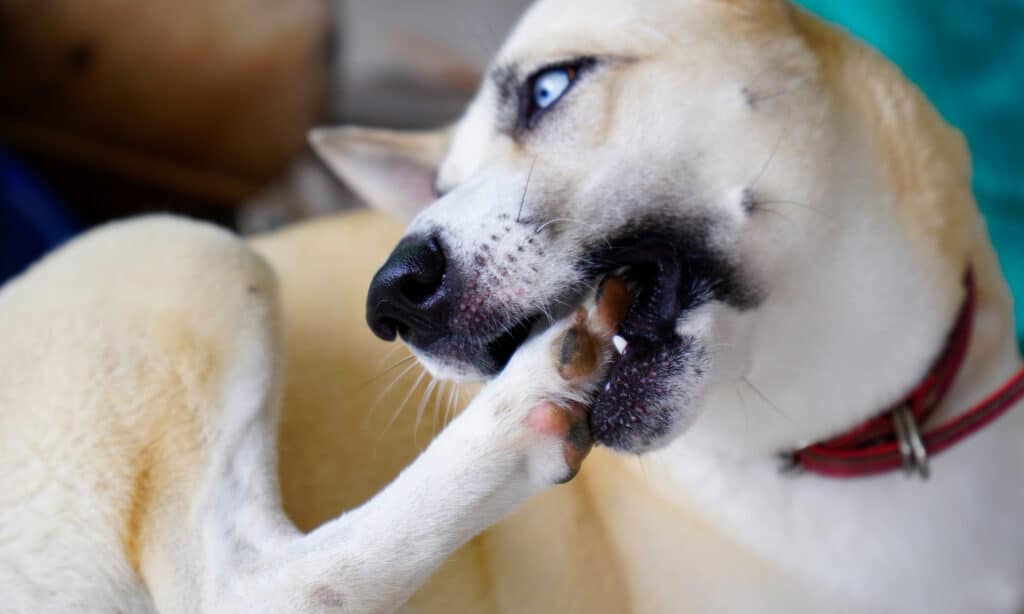
There are many reasons that dogs chew their feet but if it is excessive, take your dog to the vet.
©KPhrom/Shutterstock.com
In most cases, foot chewing is nothing to be alarmed about. It could be from a minor irritation or boredom. Your dog may also be suffering from a painful injury you might not be aware of. In any case, if it leads to bleeding, fur loss, or swelling you may need to take action and get your pet to a vet.
We’ll cover the various reasons why your dog might be biting his feet, where to draw the line, and how to get him to stop.
Why Dogs Chew Their Feet
There is a long list of reasons why your dog may chew (or lick) his feet. You will have to take a closer look at your dog’s health and potential stressors to figure out which one is to blame for your dog’s current issue. Your vet can typically help with this.
Take a closer look at some of the most common answers as to why do dogs chew their feet.
Allergies
It’s incredibly common for dogs to resort to chewing their paws to alleviate an itchy feeling. Think of it as a doggie alternative to scratching an itch (although dogs will sometimes do that with their paws as well). Allergies are a common cause of itchiness as well as irritation, leading to the urge to bite.
Anxiety
Many dogs chew on or lick themselves when they are feeling anxious, lonely, or nervous. The best way to spot this issue is to look for other indications of anxiety, such as poor digestion, elevated breathing and heart rate, and excessive drooling. You can also look out for pacing, an inability to relax, and unusual posturing.

There are many reasons dogs chew their paws, from anxiety and boredom to health issues.
©kamilpetran/Shutterstock.com
Bacterial Infection
Occasionally, dogs will develop bacterial infections on their paws. This can be the result of moisture. If this is the case, the area will also likely be red. Your vet can treat bacterial infections with antibiotics.
Boredom
Every dog deals with boredom in a different way, and some decide to lick or bite themselves when bored. The remedy for this should be obvious – give your dog some activities. Maybe specifically focus on things he can chew on to keep him from chewing his paws.
Burnt Paw Pads in Summer
When you take your dog for walks in the summer, you need to pay attention to the temperature of the concrete. If it is too hot, your pup may burn his paw pads. This can lead to chewing to relieve the pain. Prevent it with doggie booties.
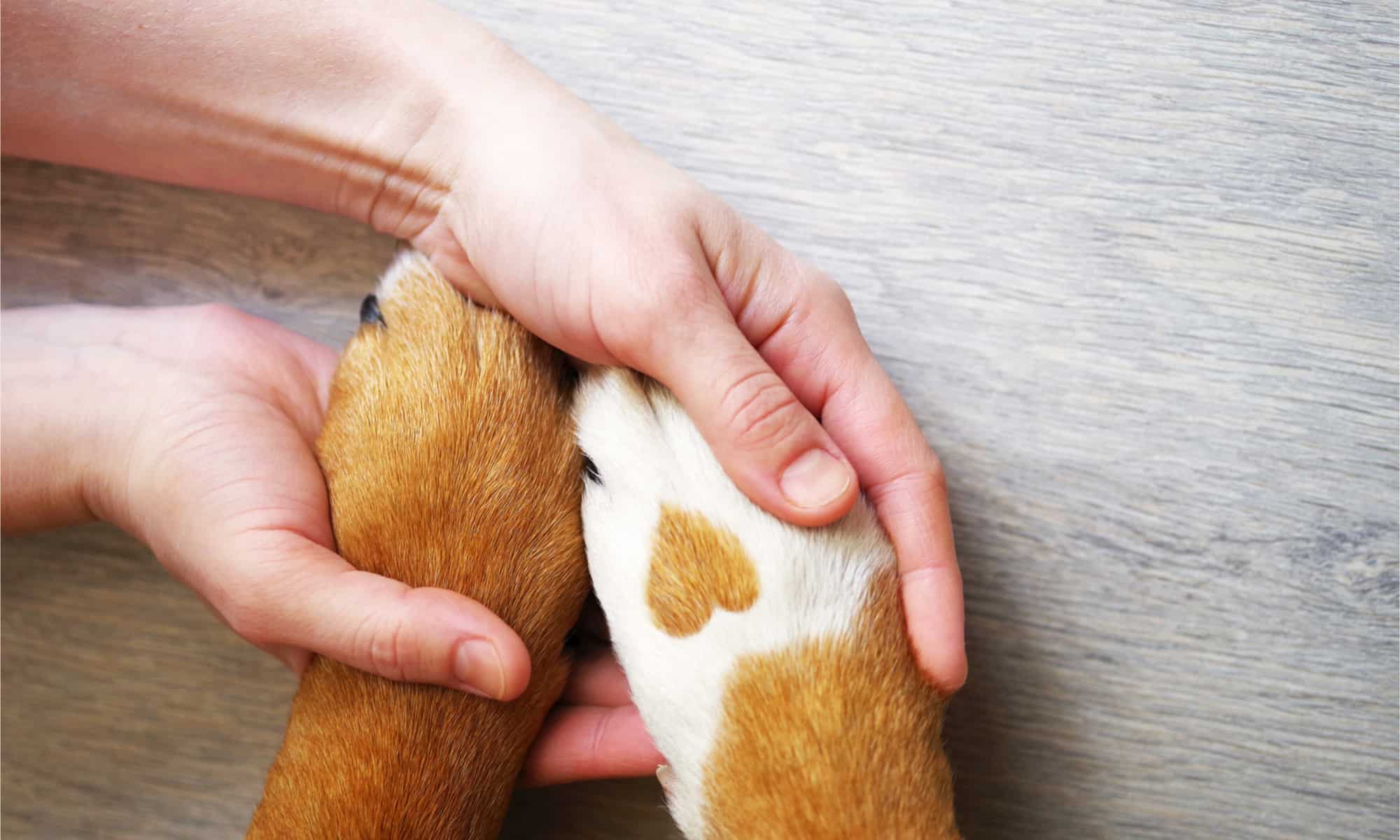
Make sure to examine your dog’s paws and nails.
©savitskaya iryna/Shutterstock.com
Claw Problems
One of the first things to check when working through why do dogs chew their paws is his claws. If a claw is broken or loose, he may be chewing on it to try to fix it. You can take care of this for them by trimming the claw. If you don’t feel comfortable doing so, bring your pup to the vet.
On a related note, ingrown claws can also cause a similar reaction. You typically need a vet to treat the ingrown claw, as it can be challenging. The vet will also check for an infection.
Contact Dermatitis
The itchiness or irritation causing your dog to chew may also be because he came into contact with an irritant. Certain grasses or yard chemicals, for example, can lead to temporary irritation.
Dry Skin
Your skin gets itchy and irritated when it is dry, and your dog is no different. If it is cold and/or dry outside, one of the first things to check should be whether your dog’s skin is dry. Moisturize his fur and the itchiness and irritation should disappear.
Injuries
It is very common for dogs to lick their wounds. This means that anytime your canine companion starts to lick or chew his feet (or another part of his body) excessively, you need to take a closer look. Look for irritation, splinters, cuts, or punctures. You can also confirm it is an injury by seeing if your pup puts weight on the relevant paw.
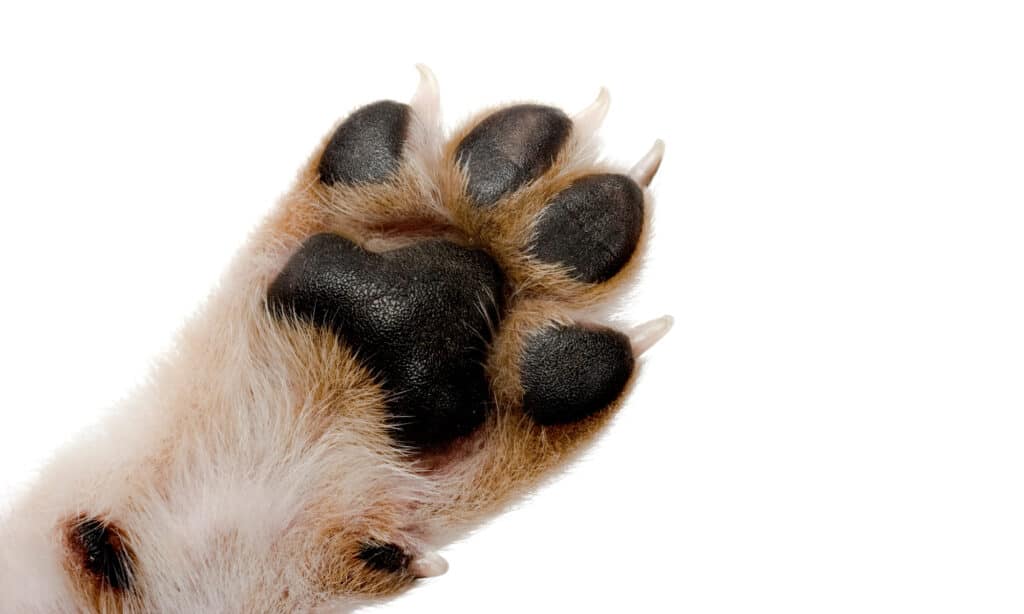
Pay close attention to all areas of your dog’s paws, especially if you see excess chewing.
©iStock.com/erikreis
Interdigital Cysts
These cysts are the result of a clogged hair follicle. They are more common on the front paws and can lead to chewing to alleviate the discomfort. Unfortunately, chewing can also cause these cysts.
Hyperkeratosis
If your dog has hyperkeratosis, it means his body produces extra keratin. That makes his toe pads or nose skin get thicker. That, in turn, results in dryness and cracking, hence the urge to lick. It is more common as your pup ages.
Pain
You don’t want your pooch to be in pain, but one of the signs of canine pain is a dog chewing on his paws or licking limbs. The pain doesn’t even have to be focused on the paw area for dogs to chew on their paws with pain. Of course, that should still be the first part of his body you check for a source of pain.
Parasites
Parasites, including fleas, can make your dog feel itchy, among other symptoms. As we’ve already established, if your dog has an itch, he’s likely to relieve it by chewing on the affected area.
Winter Salt Irritation
If you notice your dog chewing on his paws in the winter, it may be irritation from the salt put on roads and sidewalks. The best solution to this cause is to get your pup some shoes or booties.
Yeast Infection
Dogs sometimes get yeast infections on their paws. When this happens, it will typically lead to irritation, itchiness, and redness. Your vet can diagnose a yeast infection and suggest treatment.
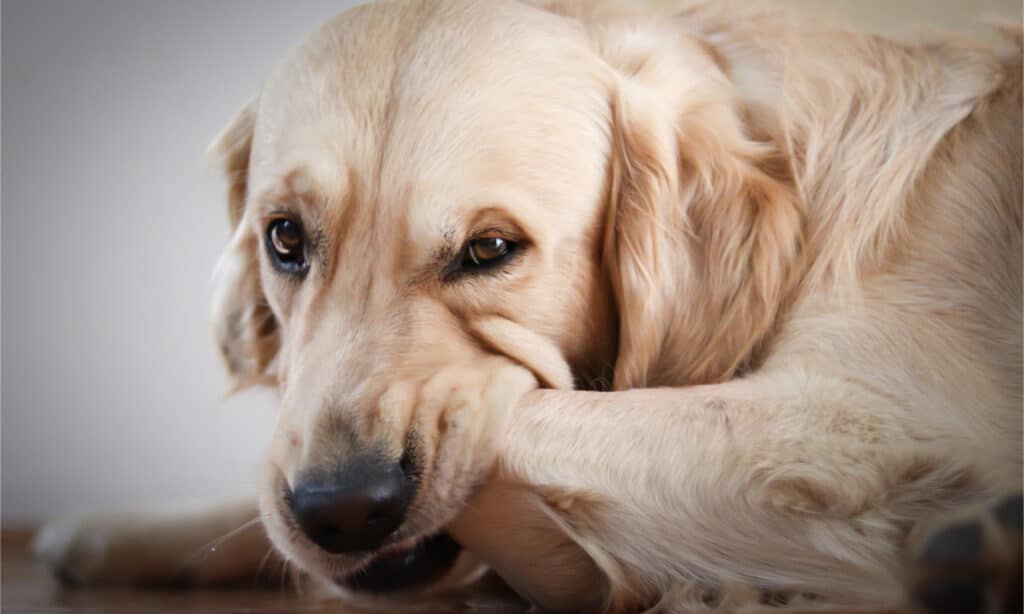
If you suspect that your dog is chewing its feet due to a health issue, your veterinarian will be able to provide a diagnosis and a treatment.
©Robert Moldvaji/Shutterstock.com
When to Be Concerned About Your Dog Chewing His Feet
Simply put, you should worry about your dog chewing on his feet if it becomes excessive. The issue can be deciding what is excessive. This is where your experience with your dog can come in handy. After just a few months of owning a dog, you likely have a good idea of how often he chews on or licks his foot. If he starts doing so more often than normal, this is a sign that it is excessive.
Sometimes, the fact that your dog is excessively biting his feet will be more obvious because he caused physical injuries. Anytime that you notice physical injuries to your dog’s paws from the biting, it is time to take the issue seriously and consult a vet.
Some important symptoms to look out for include:
- Bald spots
- Red or swollen skin
- Bleeding
- Skin that is warm to the touch
- Foot fur discoloration
- Sensitivity to touch
- Cuts or other wounds
Your vet will need to confirm which of the above potential causes is the reason why dogs chew their feet for your pooch.
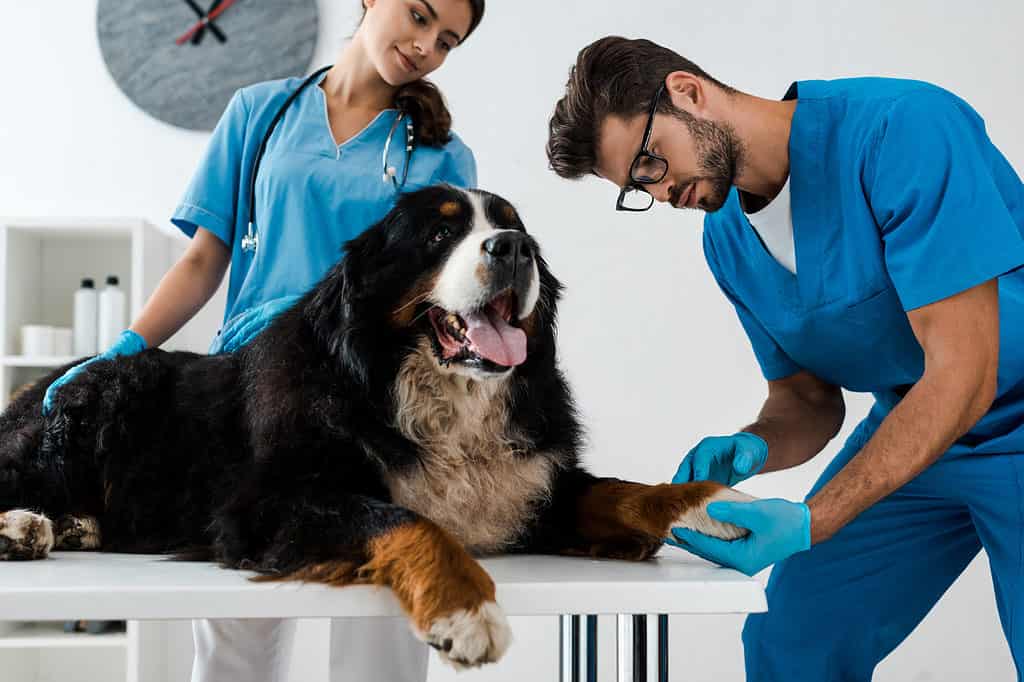
It’s always best to have your veterinarian look at your dog’s paws if there are physical injuries.
©iStock.com/LightFieldStudios
What to Do About It
The steps you take to stop your dog from biting his feet depend on the answer to why do dogs chew their feet in your situation. If he is chewing his paws from anxiety, treat the anxiety. If it is because of an infection, treat the infection. This is why getting to the bottom of the problem is so important.
The following are some of the specific remedies that can encourage your pooch to stop biting himself.
Switch to Food for Allergies
If you think the problem is allergies, start by switching your dog to a dog food designed for pups with allergies. Your vet can help you figure out which ingredient he is most likely allergic to.
Avoid or Wash After Contact with Other Allergies
In the case of environmental allergies, the best solution is to keep your pup away from them. When this isn’t possible, get in the habit of giving him a nice bath after he comes into contact with them.
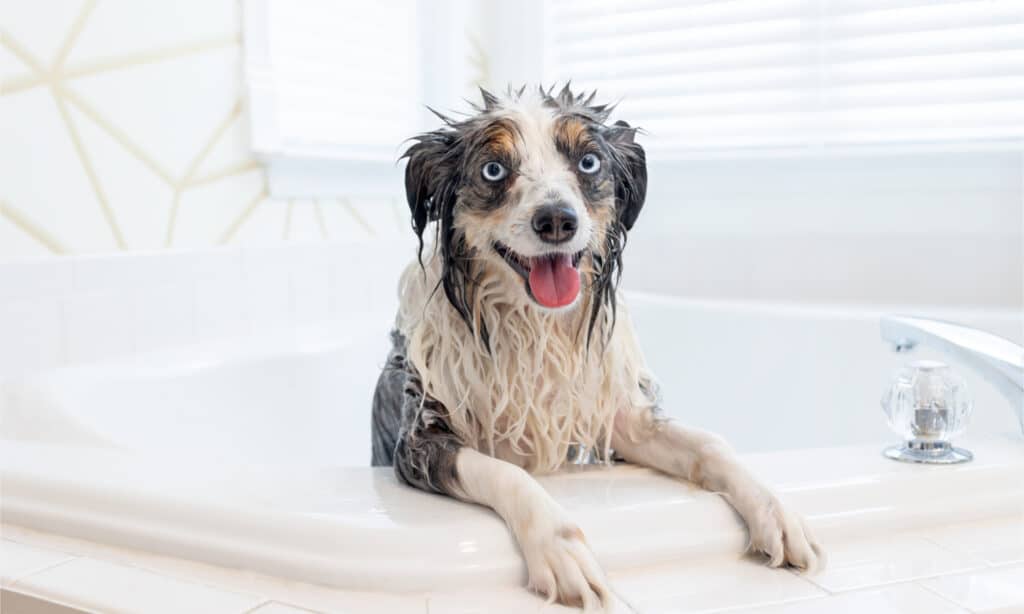
If environmental allergens cause your dog to chew its paws, a bath will wash them away.
©Danielle W Press/Shutterstock.com
Care for Your Dog’s Coat to Prevent Itching
In the case of itching from a dry coat, just work on taking better care of the coat. Add a conditioner to your dog’s bath routine or switch to a moisturizing oatmeal shampoo. Or get a balm to soothe his paw pads.
Buy Toys to Reduce Anxiety and Boredom
In the case of anxiety or boredom, look into getting your pup some toys to keep him entertained. You can also try taking him on long walks or runs to get out excess energy.
For anxiety, in particular, you should also try to identify what triggers his anxiety and then avoid those triggers.
Give Him Something Else to Chew
If you aren’t sure why your dog is chewing his paw or if it has become a behavioral pattern, you can try redirecting him. The best way to do this is by offering alternatives to chew on like chew toys.
Stay Up to Date with Your Dog’s Dewormer
The most obvious solution for chewing due to parasites is to stay up-to-date with your dog’s dewormer and flea medicine.
Get Your Dog Some Booties
If the chewing is likely due to salt irritation in the winter or burns from hot pavement in the summer, doggie booties are the best solution. There are plenty of great options available.
Why is My Dog Licking and Chewing My Feet?
Your dog’s act of licking serves several purposes: to express affection, seek attention, enhance their understanding of you, and simply because they find it enjoyable. Nevertheless, their preference for licking your feet might be due to the rich scent information present there, which provides valuable insights about your activities, whereabouts, and more.
Additionally, when dogs engage in this behavior, they are attempting to herd, mirroring the livestock herding instincts for which they were originally bred. Those who are active or engaged in energetic activities are often the ones subjected to this behavior.
It shouldn’t come as a surprise, for instance, to hear about a corgi playfully nipping at their owner’s heels, as this behavior reflects their herding heritage.
Conclusion
There are plenty of answers to why do dogs chew their feet. From injuries to infections to parasites, you will have to get to the source of the issue. Check your dog for injuries or other symptoms, such as swelling and redness. Check for dry skin and make sure your dog isn’t anxious. Always take your dog to the vet for excessive itching. They will help you treat the underlying problem.
List of Reasons Dogs Chew Their Feet
To summarize, here are the reasons dogs begin to chew on their feet:
| Rank | Reasons for Dog Foot Chewing |
|---|---|
| 1 | Allergies |
| 2 | Anxiety |
| 3 | Bacterial Infection |
| 4 | Boredom |
| 5 | Burnt Paw Pads in Summer |
| 6 | Claw Problems |
| 7 | Contact Dermatitis |
| 8 | Dry Skin |
| 9 | Injuries |
| 10 | Interdigital Cysts |
| 11 | Hyperkeratosis |
| 12 | Pain |
| 13 | Parasites |
| 14 | Winter Salt Irritation |
| 15 | Yeast Infection |
The photo featured at the top of this post is © KPhrom/Shutterstock.com
Ready to discover the top 10 cutest dog breeds in the entire world?
How about the fastest dogs, the largest dogs and those that are -- quite frankly -- just the kindest dogs on the planet? Each day, AZ Animals sends out lists just like this to our thousands of email subscribers. And the best part? It's FREE. Join today by entering your email below.
Thank you for reading! Have some feedback for us? Contact the AZ Animals editorial team.






